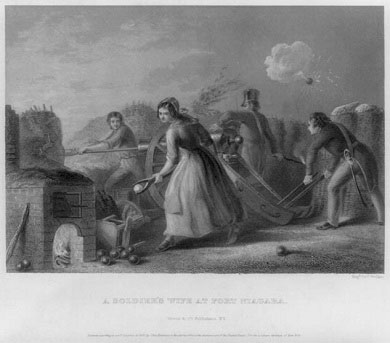While British cannonballs crashed around her, Betsy Doyle carried red-hot iron shot to the American cannons atop Fort Niagara. With her husband a prisoner of the British, Betsy was left alone to fight for survival on the frontier, going above and beyond her duty.
“An instance of extraordinary bravery” Lieutenant.-Colonel George McFeeley

Library of Congress, Prints and Photographs Division
In the early dawn of November 21, 1812, Betsy Doyle looked out from Fort Niagara across the river to Fort George, waiting for the first shots to be fired. With ammunition for only 12 hours of bombardment, the American artillery was ordered to hold unless fired upon by the British.
Betsy stood alongside soldiers of the First Regiment of United States Artillery, with whom her husband had served before his capture at the Battle of Queenston Heights just one month earlier. While Andrew Doyle remained imprisoned, Betsy continued to live and work at Fort Niagara with their children.
About an hour before sunrise, the British cannons opened fire on Fort Niagara. For the next twelve hours, the American and British artillery exchanged a cannonade that was heard along the entire length of the Niagara River.
During the exchange, Betsy carried red-hot cannonballs from a fire to the 6-pound cannon mounted on the roof of the mess-hall. That “hot shot” was intended to set fire to British buildings and battlements. But loading hot shot was difficult and dangerous. The hot iron could cause gunpowder to explode prematurely in the cannon, wounding or killing anyone nearby.
Although one man was killed and five others wounded while loading hot shot, Betsy survived the barrage, and her bravery was mentioned in official reports. The story of her actions spread quickly among officers stationed in the region.
In December 1813, Betsy fled when the British invaded and captured Fort Niagara. With her children, Betsy walked over 300 miles to the East Greenbush Cantonment near Albany, New York. Their journey took nearly four months.
Betsy served as a nurse and laundress at the cantonment for six years, but sometimes failed to receive pay from the army. In 1819, Betsy fell ill and lay in bed for a month before her death in April. According to one officer, “Her death was accelerated by the want of those necessities which her pay would have procured.” Despite her bravery and service, Betsy Doyle became a victim of the war long after it ended.
Last updated: September 8, 2017
